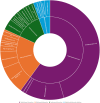Enhancing HIV Cognitive Abilities and Self-Management Through Information Technology-Assisted Interventions: Scoping Review
- PMID: 39805101
- PMCID: PMC11773289
- DOI: 10.2196/57363
Enhancing HIV Cognitive Abilities and Self-Management Through Information Technology-Assisted Interventions: Scoping Review
Abstract
Background: HIV/AIDS remains a significant global challenge, and with the rapid advancement of technology, there has been an increasing number of interventions aimed at improving HIV/AIDS cognition and self-management behaviors among patients. However, there is still a lack of detailed literature integrating relevant evidence.
Objective: This study aims to comprehensively review existing research on interventions using modern information methods to improve HIV/AIDS cognition and enhance self-management behaviors among patients. It systematically reports the theoretical frameworks and specific intervention strategies used in current research, providing a comprehensive overview of the development status of relevant studies. We aim to compile existing evidence through this scoping review to identify potential avenues for future research.
Methods: We followed the scoping review framework proposed by the Joanna Briggs Institute for the synthesis and reporting of evidence. Relevant literature was searched using electronic databases, including PubMed, Web of Science, Embase, CINAHL, and Cochrane Library. The time frame for inclusion was from 2018 to December 1, 2023. Inclusion criteria were (1) interventions using modern information technology or new digital media, (2) studies focusing on improving HIV awareness or self-management behaviors among people living with HIV, (3) intervention studies or evaluations of intervention effects, and (4) studies published within the last five years. Two reviewers (HH and MX) independently assessed each study at both the title and abstract screening stage and the full-text review stage, resolving any disagreements through discussion.
Results: A total of 55 studies that met the inclusion criteria were included. The Information-Motivation-Behavioral Skills model, Social Cognitive Theory, Health Belief Model, Theory of Planned Behavior, and Information Systems Research Framework are among the most commonly used theoretical frameworks. Modern information technology interventions are mainly constructed using smartphone apps, SMS text messaging, internet-based platforms, audiovisual materials, and digital health education platforms, with smartphone apps and SMS text messaging being the most widely used intervention media.
Conclusions: Modern information technology is becoming an important tool for health interventions among people living with HIV/AIDS. However, future research should focus on integrating theoretical framework guidance with intervention design, further exploring the diversity of intervention implementations, the applicability of different technological methods, their long-term effects, and how to more effectively combine traditional intervention strategies to maximize intervention outcomes.
Keywords: AIDS; HIV; SMS text messaging; app; behaviors; digital media; effectiveness; electronic database; information systems; information technology; mobile phone; patient; scoping review; self-management; smartphone; technology-assisted interventions.
©Hao Huang, MeiLian Xie, Zhen Yang, AiPing Wang. Originally published in the Journal of Medical Internet Research (https://www.jmir.org), 13.01.2025.
Conflict of interest statement
Conflicts of Interest: None declared.
Figures
References
-
- The path that ends AIDS: UNAIDS global AIDS update 2023. UNAIDS. 2023. [2024-12-27]. https://www.unaids.org/en/resources/documents/2023/global-aids-update-2023 .
-
- UNAIDS global AIDS update 2022 reveals millions of lives are “in danger”. U.S. Embassy in Mozambique. [2023-08-05]. https://mz.usembassy.gov/unaids-in-danger-report-2022-reveals-millions-o...
-
- Wanjala SW, Nyongesa MK, Mapenzi R, Luchters S, Abubakar A. A qualitative inquiry of experiences of HIV-related stigma and its effects among people living with HIV on treatment in rural Kilifi, Kenya. Front Public Health. 2023;11:1188446. doi: 10.3389/fpubh.2023.1188446. https://europepmc.org/abstract/MED/37427260 - DOI - PMC - PubMed
-
- Nyongesa MK, Nasambu C, Mapenzi R, Koot HM, Cuijpers P, Newton CRJC, Abubakar A. Psychosocial and mental health challenges faced by emerging adults living with HIV and support systems aiding their positive coping: a qualitative study from the Kenyan coast. BMC Public Health. 2022;22(1):76. doi: 10.1186/s12889-021-12440-x. https://bmcpublichealth.biomedcentral.com/articles/10.1186/s12889-021-12... 10.1186/s12889-021-12440-x - DOI - DOI - PMC - PubMed
-
- King E, Kinvig K, Steif J, Qiu AQ, Maan EJ, Albert AY, Pick N, Alimenti A, Kestler MH, Money DM, Lester RT, Murray MCM. Mobile text messaging to improve medication adherence and viral load in a vulnerable Canadian population living with human immunodeficiency virus: a repeated measures study. J Med Internet Res. 2017;19(6):e190. doi: 10.2196/jmir.6631. https://www.jmir.org/2017/6/e190/ v19i6e190 - DOI - PMC - PubMed
Publication types
MeSH terms
LinkOut - more resources
Full Text Sources
Medical
Miscellaneous



